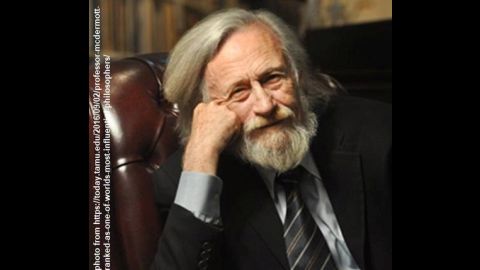

Texas A&M president Michael Young posted on his Facebook page Sunday the death of distinguished professor of philosophy and humanities Dr. John McDermott.
According to a Texas A&M news release published in September 2016 when McDermott was ranked as one of the world’s 50 influential philosophers, Young stated “Professor McDermott has utilized his passion for teaching to instill in his students a philosophy which extolls the virtue of personal growth from every life experience, including over 25,000 students during his 65 years of teaching, 40 years of which he has spent here at Texas A&M University.”
From the Facebook page of Texas A&M president Michael Young:
It is with a sense of undeniable loss and inevitable sorrow that we announce the passing today of Dr. John McDermott, Distinguished Professor of Philosophy and Humanities at Texas A&M University. I know that his colleagues in the Department of Philosophy and College of Liberal Arts are especially saddened by this news. We also have tremendous gratitude that Dr. McDermott committed his life to service as part of the fabric of Texas A&M University. There will be much more to say in the days to come about this icon, named in 2016 as one of the 50 most influential living philosophers.
For me, he was an inspiration and a friend. John was one of the first people to reach out to Marti and me when we arrived in Aggieland. He believed in the centrality of the humanities as a means to a great education because it defines what it means to be human. John McDermott never lost sight of our core mission of teaching what it means to live a good life and how to live it, the very heart of Aggies and indeed of all humanity.
Dr. McDermott’s writings and teaching not only influenced people, but also literally saved lives. I know of stories of people in great despair who read his work and it brought them back from the brink. What more could we do on this earth than to help each other?
Our love, thoughts and prayers go to Patricia and all of his family and loved ones. We must strive to fill the hole he has left at our university with the very nature of his teachings. He once said, “I want my students to come alive to themselves and buy into the importance of their own experiences. With the saturation of modern technology, I find my students to be increasingly disconnected from their own experiences. These experiences have to be cradled, reconnoitered and reconstructed.”
I suggest we all honor him by seeking each other out in person and embracing life this week and always.
Michael K. Young
